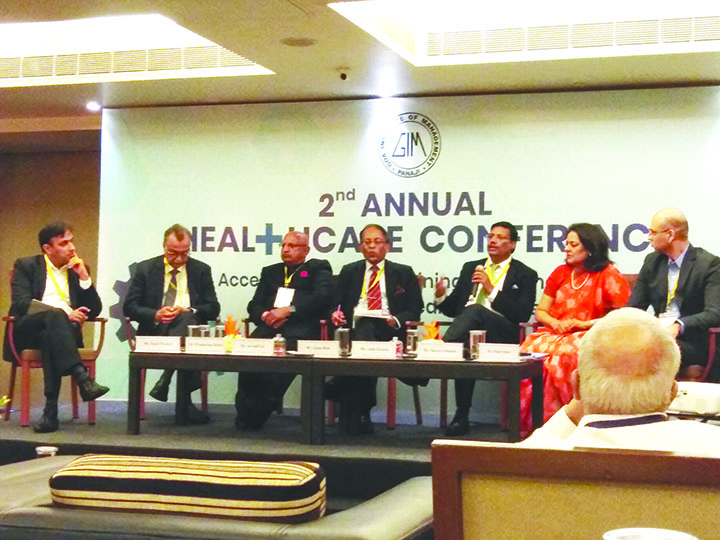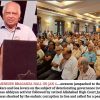Goa is abuzz with excitement as vintage bike and car owners, users, collectors and fans are decking […]

FROM BHAGWAN TO SHAITAN?
Feb 22- Feb 28 2020, Life & Living February 21, 2020healthcare India: Significant strides but still lagging behind. India’s out of pocket expediture is more than 60% of all health expenses, say various players in the healthcare industry. Seen in picture are Padmashri Dr Arvind Lal, GIM’s R Chandrashekhar, Niti Ayog’s Alok Kumar, Dr Sundarshan Ballal, Sheena Chhabra, Rohit Sathe, Anjan Bose, Ajit Parulekar and others
BY TARA NARAYAN
THERE was lots to amuse and rue over at the Goa Institute of Management’s 2nd Annual healthcare conference in Panaji on February 8, 2020. Minister for Health Vishwajit Rane who inaugurated the conference called for promotion of medical tourism and more public-private participation various other speakers detailed why the healthcare scenario in Goa and the country was dismal despite NITI Ayog (Government of India). India’s budget for healthcare is barely 1% out of a total of 3.9% GDP, it indicates that healthcare is not one of the top priorities for the ruling government despite basic government insurance schemes to cover healthcare for citizens. (Countries in Europe keep as much as 12% of GDP for healthcare and in USA there are a chain of generic medicine shops…compare to this to glorious Bharatdesh where there is more money for building statues, highways, walls, temples and other wasteful expenditure!)
In fact, Indian healthcare is down to 175th place by world standards and for aam aadmi Indians it’s more like going bankrupt spending out of pocket when sickness strikes in the family. Goa of course has better primary healthcare set into place during Portuguese colonial rule, as if almost by default! There is also the DDSSY insurance scheme which most Goans subscribe to faithfully annually but this insurance is a limited cover mostly for surgical procedures. It is really a very stingy and khadoos citizens insurance scheme although Goans renew it faithfully annually.
Niti Ayog (Government of India) advisor Alok Kumar in his talk quipped that healthcare is not like a T20 match and Indian states should not dump the responsibility on the Center alone, he urged the healthcare industry and academia involved to take up opportunities and challenges which are opening up in modern day healthcare today. He acknowledged we have a fragmented healthcare system which needs to be streamlined for better accessibility for those who need it the most. The idea is to move from a schematic to a systemic approach. From the sound of it our healthcare is all on schemes but low on systems in place to execute them.
As usual there was a lot of talk about early detection of illness to save medical costs all around the question is how to inspire trust in patients who nowadays are more inclined to think of the medical profession as not bhagwan but shaitan — can’t remember which speaker made the remark but it raised a lot of rueful laughs! Patients’ stories of being over-diagnosed and over-treated for billing purposes are many and there are any number of horrendous stories to do with hospital negligence and insensitivity– the bigger, the more five-star the hospital, the worse the experience.
The question arises that if hospitals specialize in diagnostic treatment for mercenary motives, then where is the question of preventive healthcare implementation? Although I do believe that efforts are being made to integrate the Central scheme of Ayushman Bharat with that of the Goa Medical schemes, although nobody is quite sure how this translates at ground level. Goa’s Health Minister Rane is seeking more public-private partnerships in medical specialties build up and investments in technology for quicker healthcare. He is all for something called “disruptive technology” and outsourcing diagnostics to Public Health Centres…in Goa every doctor is chasing medical tourism, in itself not a bad idea but how about treating Goans as VIPs first even if it is less lucrative? According to Vishwajit Rane, Goa is the only state which spends more than Rs100 to Rs150 crore on public healthcare and this is free of charge. Hey, free is public money so it’s not some damn favor!
FRANKLY, my dears, after being in and out hospitals on many occasions with various senior relatives in Mumbai and Goa I cannot help thinking that we don’t need more hospitals, we need more sanitariums of the old-fashioned kind. Many senior citizen patients I know don’t need or want to go to hospitals, they would rather go to naturopathy-styled sanitariums located in cooler, cleaner, refreshing places in verdant countryside…where there is ample water, sunshine, simple nutrition-based diets (as opposed to industrialized food diets) and a slew of tender loving care therapies which work at a slower but surer pace. It is all about rest, recuperation and being happy.
Actually, one of these days read up the history of the sanitariums of old, most are of tuberculosis fame but they are worth studying. After the advent of antibiotics and better healthcare they kind of faded out but as a matter of fact something like 20 lakh cases of TB are detected in India every year to this day and there’s certainly need for exclusive sanitariums for them. But I’m thinking sanitarium care as ideal for a host of non-TB patients who are acutely sick but definitely in need of another kind of curing and rejuvenation.
No, not through a hospital’s aggressive diagnostic, bed-limited and drug-based prescriptions, but through alternative therapies of the very best kind in patient-friendly environment. Most hospitals are more business-friendly if I may say so. For example, at the Manipal Hospital once I wondered why all the needless tissue rolls and antiseptic soap which Indians patients at least hardly use, and all the bottles of water…which patients are charged for. Even potable water is not free in our hospitals. The air-conditioning may be working full blast but ask for a blanket and there’ll be none to spare, or blankets will be something so inadequate that the nursing staff may well use them in between their night snoozes…but I’m not dissecting a hospital here, I’ll leave that for another time.
But what I wish for is businessmen to think of putting money along alternate lines of healthcare. The giant pharmaceutical companies are not going to think of it for vested interests but government health ministries which thrive on public money can certainly think of a chain of sanitariums for patients and services to avail of if they’re feeling old, feeble, depressed, run down, unable to cope, depressed, tired of fending for themselves (for a myriad reasons) – and are in need of a change of scene where there is just good food, fresh air, water, sunshine and loving care (along with some medical services of course).
It has been found that patients suffering from respiratory conditions recover better in sanitariums and I’m not talking old people’s or assisted living or palliative care hospices here. I’m talking real to goodness honest sanitariums which also have medical facilities necessary and of a non-invasive kind. Sanitariums must necessarily be located in healthier climates and not in densely-populated urban cities. They run on a regime of rest and good nutrition to heal the immune system more than anything else (the immune system is everything as even doctors will concur).
AMONGST the other key speakers at the jumbo healthcare conference were some eminent names in mainstream healthcare like Dr Ajit Parulekar, who in futuristic mode commented that healthcare should be moving from preventive to predictive healthcare but for that a drastic change is required – these days tele-medicine and mobile vans are doing excellent work especially in rural healthcare where there is a dearth of doctors. Then there was Dr Arvind Lal (managing director of Dr Lal Pathlabs) and R Chandrashekhar who as GIMS or Goa Institute of Management’s director had organized the conference.
Even at the conference it sounded like home-based healthcare is the real story gathering momentum in India. Speaking for it was the celebrity CEO of the Bengaluru-based Porteo home care company, Meena Ganesh. Health Minister Vishwajit Rane had referred to in his inaugural talk. She is reportedly entrepreneur with the moistest in homecare and founded Porteo in 2013, today it is the country’s largest home care company catering to “dignified living” and has a roll call of hospitals asking for the company’s services.
THIS is to say that if a government cannot put education and healthcare at the top of its list of priorities in budget considerations – it’s a government worth throwing in the dustbin of history. In this respect I would bank on Delhi’s “superman” Chief Minister Arvind Kejriwal any day, he means what he says and may he grow from strength to strength. Hanumanji and Inshallah, as well as Jesus and my mahadeo, please bless and take care of him! On that note it’s avjo, selamat datang, poiteverem, au revoir, arrivedecci and vachun yeta here for now.
— Mme Butterfly














